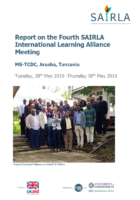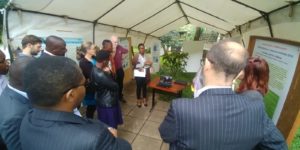 During the fourth International Learning Alliance workshop in Tanzania, members from SAIRLA research projects and National Learning Alliances were invited to share their lessons and experiences and share key findings and tools.
During the fourth International Learning Alliance workshop in Tanzania, members from SAIRLA research projects and National Learning Alliances were invited to share their lessons and experiences and share key findings and tools.
Two research projects and three NLAs presented on the theme of services under which the SAIRLA programme explores the services are needed to support SAI outcomes for smallholder farmers.
Here we summarise the presentations and highlight the key discussion points from the plenary that followed.
GALA: Integrating multi-media communication approaches and input brokerage
The research project ran a series of communication campaigns to raise awareness of sustainable legume practices and technologies using among other channels; radio, SMS, comics and radio listening groups. Project outcomes include:
- In Tanzania, as a result of the campaigns, farmers have increased their awareness and adoption of sustainable practices. The dissemination of GALA’s findings on the high use of Soya Njano by Tanzanian farmers resulted in the registration of the seed enabling it to be legally produced and sold in Tanzania.
- In Ghana, as a result of the video campaigns and the dissemination of GALA findings, the government recognised inoculants for soybean among the pool of inputs to subsidise.
Malawi NLA: Co-Learning for a Functional District Agricultural Extension Services System in Malawi
The Malawi Agricultural Extension Policy (2000), envisions that “all farmers are able to demand and access high quality extension services” through a pluralistic and decentralised extension system. The Malawi NLA is planning to conduct an action-research based study aimed at generating evidence of processes influencing the District Agricultural Extension Services System (DAESS).
Ethiopia NLA: ICT for Agricultural Extension in Ethiopia
The Ethiopia NLA organised a national level stakeholder dialogue on ICT for extension market place, held in collaboration with the Ministry of Agriculture (MoA) and other partners. SAIRLA research by Bioversity International and its local partners on an ICT approach was used as an entry to scale up to a national level. Over 90 senior experts, decision makers, researcher and investors attended. A technical working group to support the MoA’s Extension Directorate has been set up.
SRMS: Smallholder risk management solutions in Malawi and Ethiopia
The research project focuses on increasing smallholders’ access to inputs and participation in the development of commercial value chains in Ethiopia (teff) and Malawi (pigeon pea).
The project introduced their replicable business model – a continuous loop which begins with providing certified seeds to farmers and moves towards farmers returning two per cent of their harvest to a co-operative who in turn sells the harvest and use the profits for more certified seeds which are again, distributed to farmers. The researchers found that instead of money being put back into buying more certified seed, the profits were spent on food consumption instead – for example, in Ethiopia, farmers were exchanging teff with Sorghum which they could feed their families on easily and cheaply.
Ghana NLA: Multi-stakeholder social learning around the Fall Armyworm (FAW) menace in Ghana
In 2016, the Ghana NLA played a key role in the sensitisation and dissemination of evidence towards dealing with the devastating outbreak of Fall Army Worm. Through evidence sharing and social learning processes, the NLA contributed to a shift in the focus of decisions makers and other stakeholders from over-reliance on conventional synthetic pesticides to bio-rational pesticides. Activities included social learning field visits, information and evidence sharing workshops, and one-to-one engagement with decision makers. Social and print media were also used including WhatsApp, videos and newspaper articles. Key messages included:
- Middle-level policy decisions stands to benefit from FAW information sharing and learning using multi-stakeholder groups.
- Partnerships among stakeholders have provide to be the strength in the management of FAW in Ghana.
- Consideration should be given to the institutionalization of multi-stakeholder groups such as the NLA in finding solutions to problems in agriculture.
SAI means farmers need continuous access to information that his highly context-specific. The project has co-created ‘Ushauri’, a digital information service for SAI together with extension services and farmers in Tanzania and Kenya. An automated hotline provides access to a series of pre-recorded audio messages about kitchen garden horticulture (Kenya) or Aflatoxin control in the groundnut value chain (Tanzania). Farmers can also record further questions through their phones which appear on an online dashboard. Agricultural advisors record replies and send as automated replies. Key insights include:
- For farmers, the possibility to ask questions anytime as more important than the access to pre-recorded advice.
- User attrition due to lack of airtime was strong. Business models around advertisement could make the service toll-free.
‘Ushauri’ generates useful insights about farmers’ knowledge and information needs, which can be used to improve the service as well as general extension programming
During the plenary, participants were asked two questions:
- What is your main observation regarding services in relation to SAI in Sub-Saharan Africa?
- What is your main observation regarding policy and investment processes in relation to SAI in Sub-Saharan Africa?

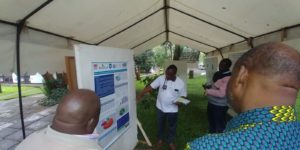
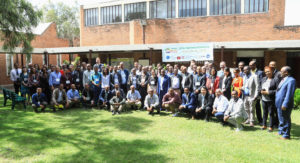
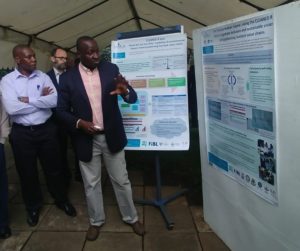
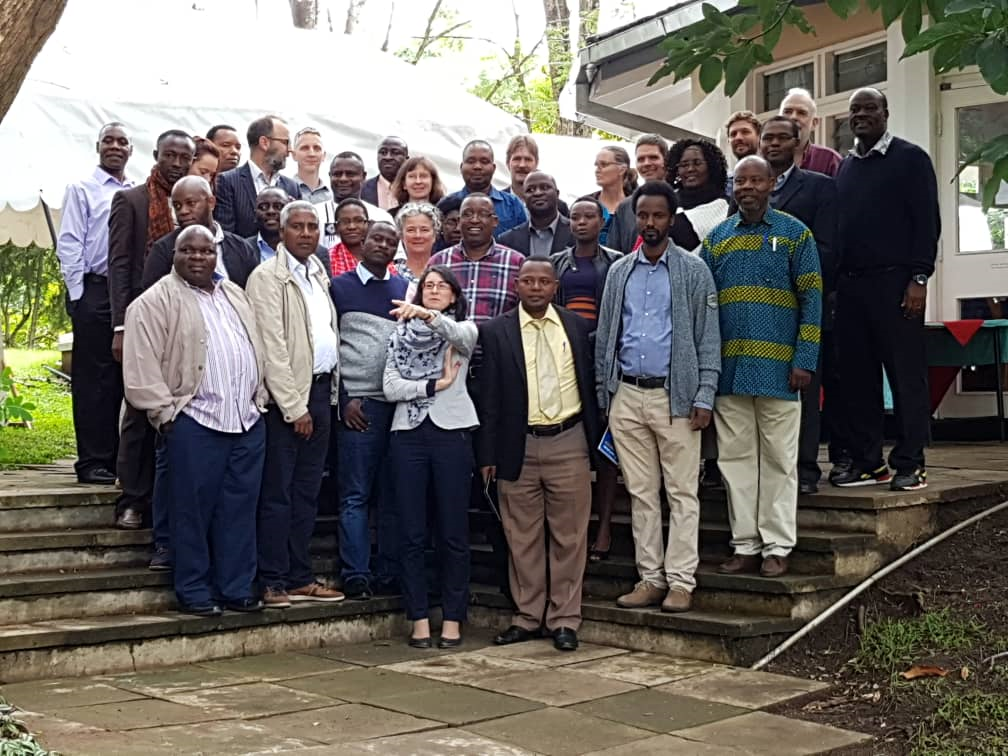
 ILA 2019: Services thematic group plenary discussion
ILA 2019: Services thematic group plenary discussion 